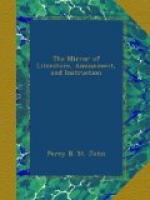“We left the lake on our right, skirted the base of Piton du Milieu, over a volcanic soil of pulverized cinders, and, by gentle descents, proceeded towards the south. Again we were among mountains, passing green lawns, and marshes overgrown with vitti-vert, (which is used for thatching,) fern, marsh mallows, waving bamboos, and wild tobacco. We saw plantations of the manioc, (bread-fruit,) maize, sweet potatoes, the cotton-tree, the sugar-cane, coffee, and cloves. Then we crossed rocky channels of clear rippling water, hedged by dwarf oaks and the dusky-coloured olive, underneath which flourished the dark-green fig-tree, with its strawberry-red marrowy fruit, bared by the bursting of its emerald-green rind. Here the majestic palmiste towered grandly alone, crowned with its first, tardy, and only fruit; and when deprived of that diadem, like earthly monarchs, it perishes. We penetrated the wild native woods, where grew the iron-wood tree, the oak, the black cinnamon, the apple, the acacia, the tamarind, and the nutmeg. Our path was arched by wild vines, jessamine, and a multitude of deep scarlet-blossomed creepers, so thickly interlaced in their living cordage, that neither sun nor storm could penetrate them; or if a wandering beam found entrance through the thick natural trellice-work, it was only enough to cover some little tuft of violets or strawberries, its own offspring, growing up in its genial warmth with a strength and vigour pre-eminent amidst the pale and sickly brood of the neglected children of the shade. Nothing I had ever imagined of the loveliness of nature equalled the reality of these scenes.”
Coffee in the East.
“On entering the zennanah, the old governante, Kamalia, having counted us on her four skinny fingers, proceeded to fulfil that sacred rite, never omitted in the east, of presenting refreshments; without the heartless and niggardly-ceremony of appealing to the guests, as is wont in Europe, to learn whether they will take them or not, looking on those who receive them with an evil eye. I followed Kamalia to know how the genuine oriental coffee is made. Good mussulmans can alone make good coffee; for, being interdicted from the use of ardent spirits, their palate is more exquisite and their relish greater.”
“Thus it is:—A bright charcoal fire was burning in a small stove. She first took, for four persons, four handsful of the small, pale, mocha berry, little bigger than barley. These had been carefully picked and cleaned. She put them into an iron vessel, where, with admirable quickness and dexterity, they were roasted till their colour was somewhat darkened, and the moisture not exhaled. The over-roasted ones were picked out, and the remainder, while very hot, put into a large wooden mortar, where they were instantly pounded by another woman. This done, Kamalia passed the powder through a camel’s-hair cloth; and then repassed it through a finer cloth. Meanwhile a coffee-pot, containing exactly four cups




